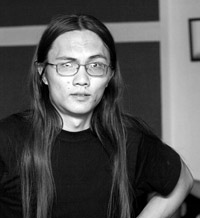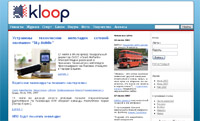 Q: Bektour, it's nice to meet you. Can you tell me what Kloop is and how it works?
Q: Bektour, it's nice to meet you. Can you tell me what Kloop is and how it works?
A: Kloop is a web portal that consists of a news section and a blog platform. At the moment, the news is written by young reporters, mostly high school and university students. The blogs are open for everyone, and we already have 66 blogs registered on the website. One of the most important aims is also to create a citizen journalism service, where everyone can post news to the website through different means (by mobile phone for example). Of course the posts will be moderated by our staff.
Q: You say you are moderating posts – do you do this on people's personal blogs or just on your news aggregation site?
A: No, we do this in the news section only. We never moderate blogs.
Q: Are you getting funded for your operations?
A: Kloop is sponsored by Hivos, and is created by the Kloop Media Foundation in partnership with the Children's Media Centre, an experienced youth media organization from Bishkek.
Q: What made you start with this ambitious project?
A: There were two initial founders of Kloop: me and Rinat Tuhvatshin. I suppose it was in the end of 2005 when I started being interested in blogging so much. I thought (and I still think) it is great that every person on the Earth can potentially become a journalist and publish online, and with blog platforms it is really easy to do.
At the same time Rinat Tuhvatshin was inspired by the idea of citizen journalism. We just gathered our ideas together and decided to create a web portal that would contain both of these ideas.
Q: Were you inspired by something that has worked in other countries and made you start this Kyrgyzstani service?
A: Initially, I was inspired by such blog services as Livejournal and Blogspot. These were actually the first blogs I saw. Later I found Global Voices and neweurasia which were even more similar to our idea, but I found these sites when our idea had been constructed already.
Q: What do Kloop bloggers blog about?
A: Different issues are discussed… We've got several photoblogs, my favourite one is chess.kloop.kg, whose author, Chingiz Narynov, is a young film director from Bishkek. We've got quite a politicized blog created by the user sahlan – the last target of his criticism was our prime minister Almazbek Atambayev.
We will never ban our bloggers for their political views, but the news section of Kloop is always neutral. That is our policy. There are few reasons to delete the blog: pornography, propaganda of violence and so on.
Q: Why do you think will Kloop be successful in Kyrgyzstan? What makes it different from other blog platforms such as LJ and WordPress.com?
A: There is a very important financial reason: we are located on a local server. That means that for many Internet users in Kyrgyzstan it is much cheaper to have a blog on Kloop rather than on a foreign platform. Besides that, our bloggers don't need to pay for better skins (as it is on LJ).
We are preparing more things for the future. That will be mostly connected with advertising. When our text ad service is ready (hopefully, that will happen before September), every blogger will be able to join our website advertising system and get some profit from it.
 Q: How will you sign up more people for your service? Is there an upper limit?
Q: How will you sign up more people for your service? Is there an upper limit?
A: Well, at the moment we've got 320 GB of space in the net, thanks to Hivos who sponsored the acquisition of a separate web server for Kloop. We give every blog a space of 100 MB, which means that if there are 1000 blogs, some 100 GB will be reserved for them. Certainly, we will try to buy more servers in the future, I think that in a year we will come to a moment when we will need much more webspace.
Our advertising campaign will start in August. The Kloop ad banners will be placed mostly on the most popular Kyrgyz websites. But we also plan some unusual advertising actions, like drawing graffiti with our logo. We've got several ideas of free advertising of such a kind. I hope it will work.
Q: Are you working together with other citizen journalism networks?
A: We are close friends with neweurasia, if this project can be called citizen journalism… We plan to conduct some joint new media and blogging trainings in the future, mostly for people from Central Asia. We'll probably hold the first one at the end of this year.
Q: Can you tell us about the potential of blogging in a country like Kyrgyzstan, where not many people go online regularly?
A: I cannot exactly cite the source right now, but as far as I know, every fifth Kyrgyzstani citizen has access to the Internet. I suppose these are the figures of 2006. 20 per cent is a really high figure for the former Soviet Union. I am happy with the fact that the Internet is not censored in our country and it is also very cheap. You usually have to pay just 25 soms (which is less than 1 USD) to get an hour of access in the Internet café. If it continues that way, I think that quite a high proportion of the population will go online regularly.
Q: Usually, it's mostly people from Bishkek and Osh who go online regularly. How can you make the voices from the regions heard?
A: This year we got in touch with American Corners in Kyrgyzstan. These are centres located in five cities of Kyrgyzstan: Karakol, Kant, Talas, Jalalabat and Batken. All of them are equipped with a library and with several computers connected to high-speed Internet. We plan to cooperate with them and to hold journalism trainings for the local youth in these Corners. While Internet is free in these centres, we hope that they would become some kind of local Kloop bureaus. And that way we can attract quite a lot of bloggers from the little towns of Kyrgyzstan. I certainly hope so.
The first towns we'll go to are Karakol and Kant. If everything goes well there, we'll popularise the Internet in other regions as well.
Q: What other blogs do you read?
A: When I learned about Global Voices, I was really glad that there is some kind of a centre point of blog reviews from all around the world. This is probably my favourite blog reviews site. One of the last things I read (and was shocked with) was a link to the Iraqi female blogger who described how she avoided the bomb blast and almost lost her life.
I've got an old LJ account and still read my friends feed there. There are some interesting bloggers in Kyrgyzstan whose blogs I do like to read very much, such as Elena Skochilo, for example. She posted news about our coup d'etat of March 2005, and she was working faster than the local news sites in these days.
Q: Do you plan to introduce the site in Kyrgyz and maybe Uzbek languages?
A: We'll certainly need to do that, especially if we start working outside Bishkek. We don't have enough funds yet to hire Kyrgyz-language staff and to develop the Kyrgyz version. But we plan to do that the next year. We need to set up the Russian version first.
Q: What is the most challenging aspect of your work?
A: Still, the most challenging aspect is that too many people in our region (I mean the whole of Central Asia) either do not know about blogging and citizen journalism or do not believe in that. On the other hand, we are really glad to be one of the first here to develop these new spheres of media.
Q: Bektour, thanks a lot for taking the time to answer the questions!
Comment Ben: I met with Bektour Iskender in Prague last weekend and was surprised to hear of his website. One of the problems I find especially with projects that receive money from the same donors (disclosure: Global Voices, neweurasia and Kloop are receiving funds from Hivos, a Dutch NGO) is that they don't link up enough among themselves. Now that we know of Bektour's website, I'm sure we'll be in touch with him more often and also link to the blogs on his server frequently.







10 comments
Thank you for this interview.